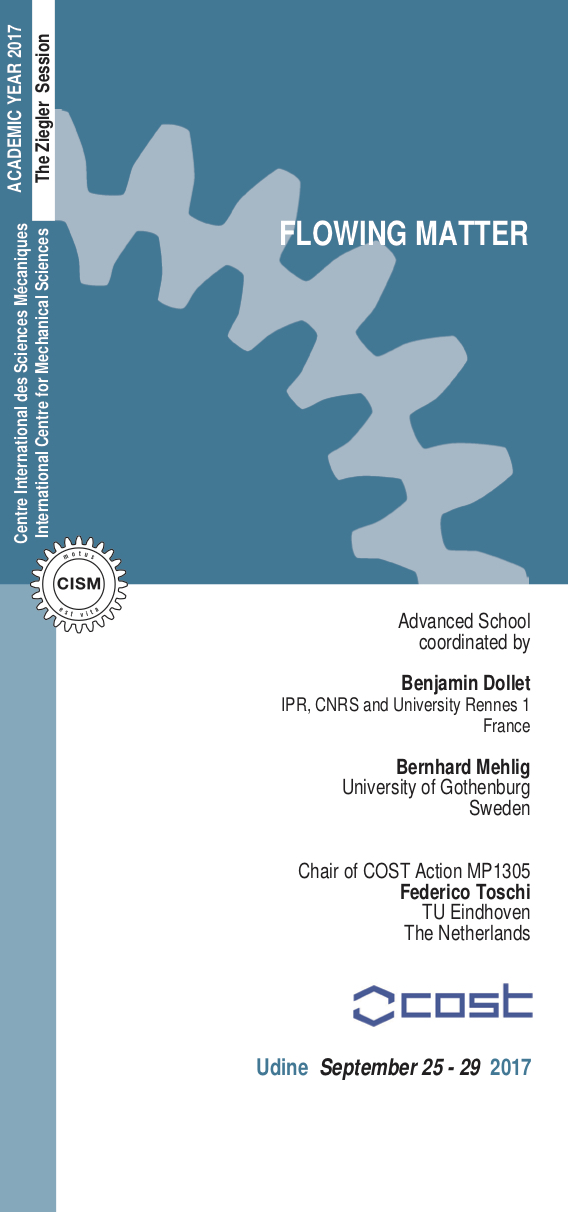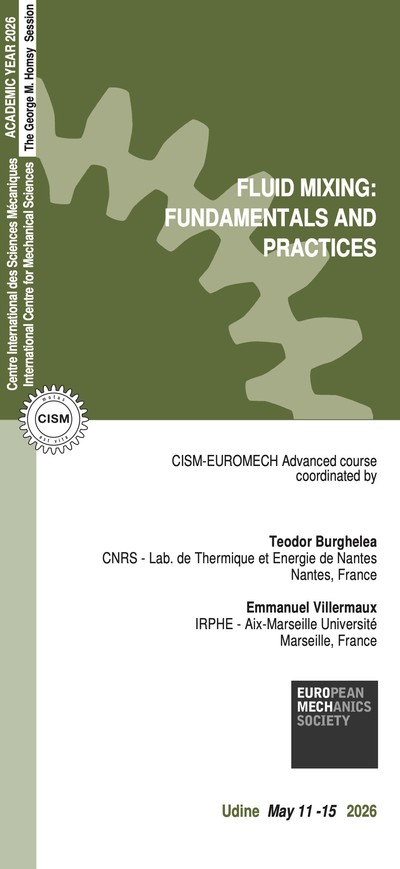Flowing matter occurs everywhere around us. There are many examples that illustrate the richness and complexity of flowing matter: from dilute suspensions of active and inactive matter (swimming micro-organisms or inorganic matter transported through the ocean) to dense complex fluids that are suspensions of many interacting parts (glasses, foams). Flowing matter is now an important research topic with many different facettes. Some have only recently appeared (active matter), while others have recently gained new momentum, due to new experimental techniques such as particle tracking, by recent advances in methods for firstprinciple computer simulations, and guided by new theoretical insights. These recent developments have brought the fundamental questions of flowing matter into focus. What are appropriate microscopic models? How do microscopic dynamics and interactions give rise to large-scale macroscopic patterns and dynamics? Which aspects of the dynamics of flowing matter are universal? What role does turbulence play in flowing matter? In the last few years there has been substantial progress in answering these questions, but there are still fundamental difficulties and many open questions. The aim of this CISM course is to give PhD students, postdocs and young researchers an overview of current analytical and computational techniques that are used in different fields to describe flowing matter. The following topics are covered: low-Reynolds-number hydrodynamics; rheology of glasses, foams, and colloidal suspensions; active matter; particles in turbulence. We intend to highlight universal aspects, and the lectures will assess successes and shortcomings of the state-of the art theory. The goal is to identify key open problems that provide interesting research questions for PhD students, postdocs, and you researchers. This school is organized in collaboration with the European Cost action MP1305 Flowing matter. In addition to the planned lectures the COST action will arrange a number of shorter research seminars that complement the topics covered in the regular lectures.
B. Andreotti, Y. Forterre, O. Pouliquen, Granular media: between fluid and solid, Cambridge University Press, Cambridge (2013). E. Guazzelli, J. F. Morris (Illustrated by Sylvie Pic), A physical introduction to suspension dynamics, Cambridge Texts in Applied Mathematics, Cambridge University Press (2012). Slides available at www.cambridge.org/9780521193191 D. Rodney, A. Tanguy, D. Vandembroucq, Modeling the mechanics of amorphous solids at different length scale and time scale, Modelling and Simulation in Materials Science and Engineering 19: 083001 (2011). https://arxiv.org/pdf/1107.2022v1.pdf D. Bonn, J. Paredes, M. M. Denn, L. Berthier, T. Divoux, S. Manneville, Yield stress materials in soft condensed matter, arXiv preprint arXiv:1502.05281 (2015). https://arxiv.org/pdf/1502.05281v1.pdf A. Nicolas, The Flow of Amorphous Solids: Elastoplastic Models and Mode-Coupling Theory. PhD Diss., Université de Grenoble (2014). www.theses.fr/2014GRENY029.pdf M. Fuchs, M. E. Cates, A mode coupling theory for Brownian particles in homogeneous steady shear flow, Journal of Rheology 53: 957-1000 (2009). http://arxiv.org/pdf/0903.4319v1.pdf R. Golestanian and A. Ajdari, Analytic results for the three-sphere swimmer at low Reynolds number, Phys. Rev. E 77, 036308 (2008). R. Golestanian and A. Ajdari, Stochastic Low Reynolds Number Swimmers, J. Phys.: Condens. Matter 21, 204104 (2009). R. Golestanian, T.B. Liverpool and A. Ajdari, Design rules for phoretic micro- and nano-swimmers, New J. Phys. 9, 126 (2007). N. Uchida and R. Golestanian, Synchronization and Collective Dynamics in A Carpet of Microfluidic Rotors, Phys. Rev. Lett. 104, 178103 (2010). N. Uchida and R. Golestanian, Hydrodynamic Synchronization between Objects with Cyclic Rigid Trajectories, Eur. Phys. J. E 35, 135 (2012). S. Saha, R. Golestanian and S. Ramaswamy, Clusters, asters, and collective oscillations in chemotactic colloids, Phys. Rev. E, 89, 062316 (2014). S. Kim and S. J. Karrila, Microhydrodynamics, Principles and Selected Applications, Dover, Mineola, New York. Chapters 1 and 2. F. Toschi and E. Bodenschatz, Lagrangian properties of particles in turbulence, Ann. Rev. Fluid Mech. 41 375-404 (2009). K. Gustavsson and B. Mehlig, Statistical models for spatial patterns of heavy particles in turbulence, Adv. Phys. 65 1-57 (2016). Sections 1 to 4. Cantat, S. Cohen-Addad, F. Elias, F. Graner, R. Höhler, O. Pitois, F. Rouyer, A. Saint-Jalmes, Foams, Structure and Dynamics, Ed. S. J. Cox, Oxford University Press (2013). S. Cohen-Addad, R. Höhler, O. Pitois, Flow in foams and flowing foams, Annu. Rev. Fluid Mech. 45, 241-267 (2013). B. Dollet, C. Raufaste, Rheology of aqueous foams, C. R. Physique 15, 731-747 (2014). J. Mewis, N. J. Wagner, Colloidal Suspension Rheology, Cambridge University Press (2012).
Benjamin Dollet (None)
3 lectures on: Rheology of Foams and Brownian Suspensions Physical and chemical parameters describing foams; Foam structure; Theory of foam drainage; Theory of foam coarsening; Phenomenology of foam rheology; Elastoplastic models of foam rheology; Origins of dissipation in foams, and surfactant dynamics; Pressure waves in foams; Elements of rheology of colloidal suspensions.Ramin Golestanian (None)
3 lectures on: Active matter. Fundamentals of low Reynolds hydrodynamics, Oseen tensor; Microswimmers (simple models, experiments, hydrodynamic interactions); Stochastic swimmers; Hydrodynamic synchronisation (generic conditions, collective behaviour); Controlling swimmer behaviour (run and tumble, phototaxis); Active colloids (generic theory of phoretic self-propulsion, experiments, effect of boundary); Selforganization of active colloids (active colloidal molecules, chemotaxis, phototaxis); open questions.Elisabeth Guazzelli (None)
4 lectures on: Low-Reynolds-Number Hydrodynamics and Suspension Rheology. Introduction to the dynamics of particulate suspensions. Low-Reynolds number suspensions; microhydrodynamics with single-body and pair-body dynamics. Assemblies of hydrodynamically interacting particles. Suspension rheologyKirsten Martens (None)
3 lectures on: Mechanics of Glasses. Glasses are created either by a rapid quench in temperature of a liquid or by increasing the packing fraction in a particle suspension above jamming, such that particles are trapped into metastable states within a highly complex potential energy landscape.The dynamics of these systems is strongly out-of-equilibrium and there is no unifying theory to describe the yielding and the flow of these glassy systems under applied forces. However, there exist several approaches, often phenomenological, to tackle these questions and in this course I will cover amongst other things the mode-coupling approach, as well as the microscopic and mesoscopic approaches proposed in the literature.Bernhard Mehlig (None)
3 lectures on: Particles in Turbulence Models; preferential concentration, small-scale clustering, relative velocities; effect of Brownian translation/rotation (connection to lecture 1), active particles (connections to lectures 3 and 4); non-spherical particles; open questions.The registration fee is 575.00 Euro + VAT taxes*, where applicable (bank charges are not included). The registration fee includes a complimentary bag, four fixed menu buffet lunches (on Friday upon request), hot beverages, downloadable lecture notes and wi-fi internet access. Applicants must apply at least one month before the beginning of the course. Application forms should be sent on-line through our web site: http://www.cism.it. A message of confirmation will be sent to accepted participants. If you need assistance for registration please contact our secretariat. Applicants may cancel their course registration and receive a full refund by notifying CISM Secretariat in writing (by email) no later than two weeks prior to the start of the course. If cancellation occurs less than two weeks prior to the start of the course, a Euro 50.00 handling fee will be charged. Incorrect payments are subject to Euro 50.00 handling fee. A limited number of participants from universities and research centres who are not supported by their own institutions can be offered board and/or lodging in a reasonably priced hotel or student dormitory, if available. Requests should be sent to CISM Secretariat byJuly 25th, 2017 along with the applicant's curriculum and a letter of recommendation by the head of the department or a supervisor confirming that the institute cannot provide funding. Preference will be given to applicants from countries that sponsor CISM. Information about travel and accommodation is available on our web site, or can be mailed upon request.
* Italian VAT is 22%.





